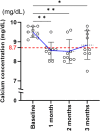Bone turnover markers as predictors of hypocalcemia in patients with bone metastases receiving denosumab
- PMID: 40098983
- PMCID: PMC11911062
- DOI: 10.1093/jbmrpl/ziaf013
Bone turnover markers as predictors of hypocalcemia in patients with bone metastases receiving denosumab
Abstract
Denosumab treatment is effective for the prevention of skeletal-related events in patients with bone metastases. However, hypocalcemia has been recognized as a serious adverse effect of denosumab. This study aimed to identify the risk factors for hypocalcemia in patients with bone metastases. In this prospective open-label study, 35 patients with bone metastases to be treated with denosumab were recruited. During the 3 months follow-up, 9 patients (25.7%) experienced hypocalcemia. Higher bone turnover status at baseline was observed in patients with hypocalcemia than in those without hypocalcemia following denosumab administration (total-P1NP, TRACP-5b, and S-NTX: all p < .05). Negative correlations were observed between the lowest calcium levels and baseline bone turnover markers (BTMs) levels (total-P1NP: r = -0.3987; TRACP-5b: r = -0.3664; S-NTX: r = -0.3672, all p < .05). Multivariate logistic regression analysis revealed that patients with high BTMs (BAP > 32.1 μg/L, total P1NP > 82.3 μg/L, TRACP-5b > 866 mU/dL, S-NTX > 30.8 nmol BCE/L) had a higher risk of hypocalcemia, even after adjusting for reported risk factors, such as age, baseline calcium levels, and renal function (BAP > 32.1 μg/L: OR = 10.4; total P1NP > 82.3 μg/L: OR = 22.07; TRACP-5b > 866 mU/dL: OR = 36.5; S-NTX > 30.8 nmol BCE/L: OR = 39.74, all p < .05). This study shows that denosumab significantly affects serum calcium levels in patients with bone metastases who have high bone turnover status. Bone turnover markers could serve as surrogate markers to predict hypocalcemia.
Keywords: Bone metastasis; Bone turnover markers; Denosumab; Hypocalcemia.
© The Author(s) 2025. Published by Oxford University Press on behalf of the American Society for Bone and Mineral Research.
Conflict of interest statement
The authors declare no conflicts of interest related to this project.
Figures




References
LinkOut - more resources
Full Text Sources
Research Materials

